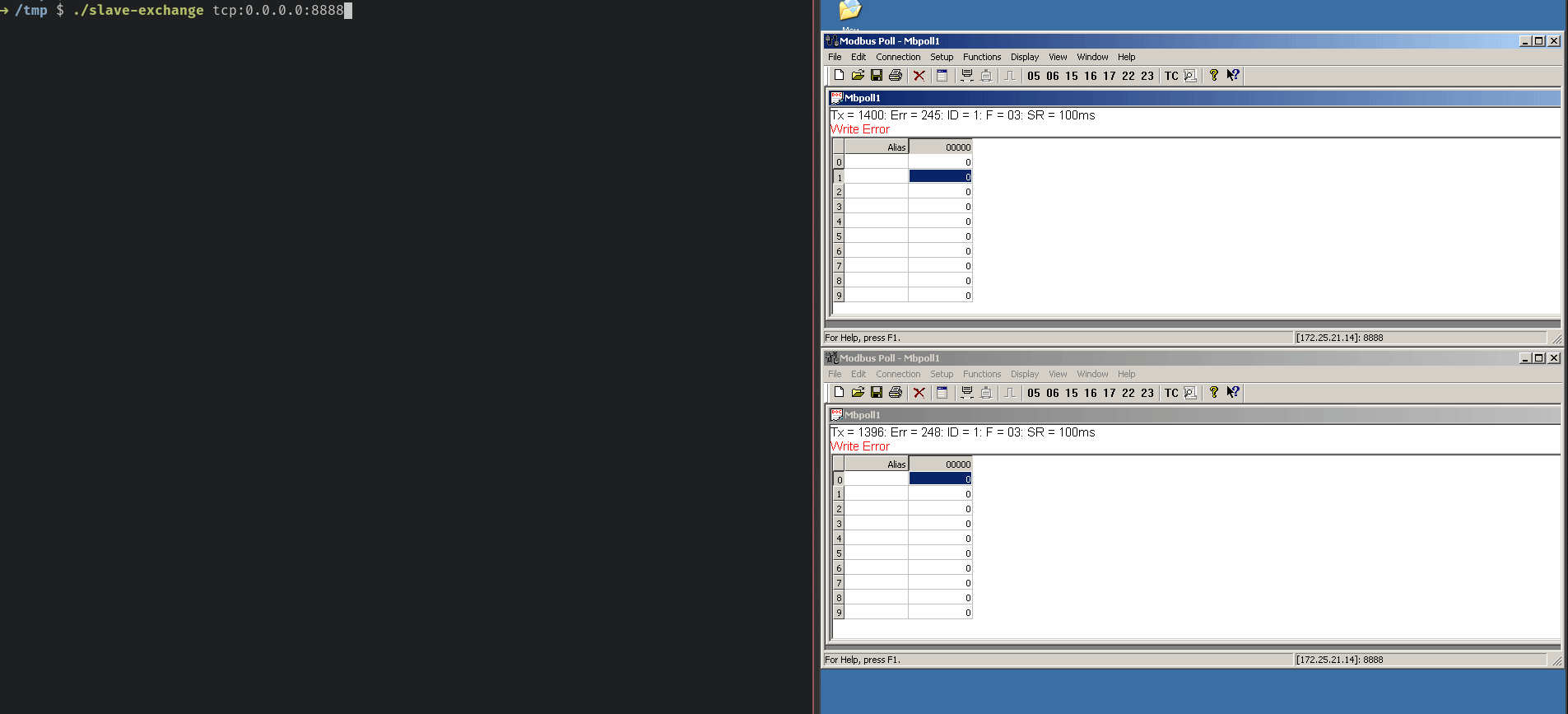Tools for working with Modbus protocol powered by Rust/Tokio. Apps are available online. See here for details.
Slave emulator that generates random answers to read requests and positively acknowledges on write commands. Useful for fast check of Modbus masters like SCADA systems, custom client implementations, etc.

The easiest way is to build and run via Cargo. By default, Modbus TCP uses 502 port that, in most cases, requires root privileges. Therefore all examples are presented on port 1502.
cargo run --bin slave-rnd tcp:0.0.0.0:1502
..
[2022-07-08T14:49:25Z INFO slave_rnd] start server 0.0.0.0:1502
[2022-07-08T14:49:25Z INFO slave_rnd] start message processor
[2022-07-08T14:49:25Z INFO slave_rnd] press Ctrl+C to exit
[2022-07-08T14:49:27Z INFO transport::tcp::server] 127.0.0.1:44544 connected
[2022-07-08T14:49:30Z INFO transport::tcp::server] 127.0.0.1:44548 connected
Run with verbose output.
RUST_LOG=trace cargo run --bin slave-rnd tcp:0.0.0.0:1502
...
[2022-07-08T14:50:16Z INFO slave_rnd] start server 0.0.0.0:1502
[2022-07-08T14:50:16Z INFO slave_rnd] start message processor
[2022-07-08T14:50:16Z INFO slave_rnd] press Ctrl+C to exit
[2022-07-08T14:50:16Z INFO transport::tcp::server] 127.0.0.1:56896 connected
[2022-07-08T14:50:17Z DEBUG codec::net::default] 127.0.0.1:56896 unpack [0, 197, 0, 0, 0, 6, 1, 3, 0, 0, 0, 10]
[2022-07-08T14:50:17Z DEBUG transport::tcp::server] 127.0.0.1:56896 RequestFrame { id: Some(197), slave: 1, pdu: ReadHoldingRegisters { address: 0, nobjs: 10 } }
[2022-07-08T14:50:17Z DEBUG transport::tcp::server] 127.0.0.1:56896 ResponseFrame { id: Some(197), slave: 1, pdu: ReadHoldingRegisters { nobjs: 10, data: Data { buffer: [145, 4, 173, 2, 122, 70, 61, 128, 56, 198, 89, 37, 62, 72, 5, 186, 233, 123, 79, 21] } } }
[2022-07-08T14:50:17Z DEBUG codec::net::default] 127.0.0.1:56896 pack [0, 197, 0, 0, 0, 23, 1, 3, 20, 4, 145, 2, 173, 70, 122, 128, 61, 198, 56, 37, 89, 72, 62, 186, 5, 123, 233, 21, 79]
[2022-07-08T14:50:17Z DEBUG codec::net::default] 127.0.0.1:56896 unpack [0, 198, 0, 0, 0, 6, 1, 3, 0, 0, 0, 10]
..
Run in serial mode.
cargo run --bin slave-rnd serial:/dev/ttyUSB0:38400-8-N-1
A slave emulator allows connecting N masters. Some masters can write into registers, and others can read. Typical usage is temporary storage for connecting different components of a system.

Running:
cargo run --bin slave-exchange tcp:0.0.0.0:1502 udp:0.0.0.0:1502 serial:/dev/ttyUSB0:9600-8-N-1
..
[2022-12-07T19:43:18Z INFO transport::builder] start tcp server 0.0.0.0:1502
[2022-12-07T19:43:18Z INFO transport::builder] start udp server 0.0.0.0:1502
[2022-12-07T19:43:18Z INFO transport::builder] start rtu slave /dev/ttyUSB0:9600-8-N-1
[2022-12-07T19:43:18Z INFO slave_exchange] press Ctrl+C to exit
Supported modes:
Supported transport:
Supported functions:
ARMv7 binaries could be run, for example, on Raspperry PI (32 bit) or iMX6UL.
cargo build --target=armv7-unknown-linux-gnueabihf
cargo build --release --target=x86_64-pc-windows-gnu
slave-rnd - 194.60.201.127:502. TCP and UDP transport is enabled.
slave-exchange - 194.60.201.127:1502. TCP and UDP transport is enabled.